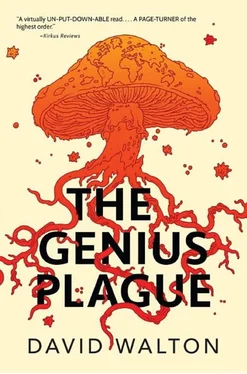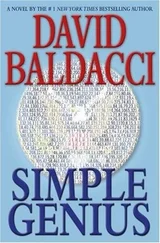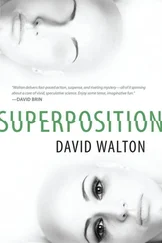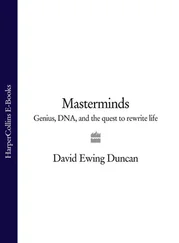“You wish,” he said, and placed the word quisling , tile by triumphant tile, across two triple word scores.
My humiliating trouncing at the Scrabble board was repeated the next day. In desperation, I suggested chess, usually Paul’s game of choice. That turned out even worse, with Paul chasing my pieces across the board with a series of brilliant moves, each of which gave me little choice but to cede him more control of the center of the board. Eventually, he skewered my queen and king with a combination I didn’t see coming, and I acknowledged myself beaten.
Despite losing all of the samples he had taken on his Amazon trek, Paul was apparently making great strides with his research, too. He was full of stories about multilocus genotyping and clonal lineage, largely incomprehensible to me but greatly exciting to him.
My time at work, on the other hand, was making me feel like the greatest moron ever to walk the planet. The NSA used more acronyms than they used actual English words, all of them symbols for this or that program, person, country, technology, or division. I felt like I was learning a new dialect of English, one with no dictionary. When I asked for clarification, the answers were usually cluttered with just as many incomprehensible terms as the original statement. I was left with the impression that there was no reason to bother encrypting the NSA’s interoffice communications, since no one outside the NSA would understand what they were talking about anyway.
I spent most of my time working with Andrew Shenk, the other man in my cubicle. He was a Spanish speaker and mathematician, who was the team’s specialist on South American indecipherables. There had been a recent rash of such messages from Colombia, all of which had a similar signature, but which no one had been able to crack. The messages had been traded between representatives of Colombia’s two major guerrilla armies, the FARC ( Fuerzas Armadas Revolucionarias de Colombia ) and the ELN ( Ejército de Liberación Nacional ). The two groups were historically hostile not only to the government but to each other, yet they had recently been working with some degree of cooperation.
I was getting a crash course in Colombian politics, and while I had known of the existence of these two groups—they had been involved in ongoing rebellions and terrorism against their government for decades— I was surprised to learn that they consisted of thousands of well-armed soldiers and dominated significant portions of the country. The Colombian police and military were more or less powerless in FARC- or ELNcontrolled territory, where the guerrillas conducted all kinds of illegal activities, including logging and mining in protected regions of the Amazon jungle and the forcible taxation of local farms. Their primary source of funds, however, was the drug trade, supplying the never-ending appetite of the United States and Europe for cocaine.
“Why are we worrying about drugs anyway?” I asked. “Isn’t that the FBI’s job?”
Andrew looked at me like I was an idiot. He had a great surprised-at-the-depths-of-my-ignorance look, and he used it often. “Drugs are money,” he said. “Money is power. Keeping track of the balance of power in South America is all about understanding the flow of drugs. More than troops and weapons, even. The FBI tries to slow the torrent of drugs into this country; that’s not our concern, at least not directly. But how it affects the balance of power? That’s central to what we do.”
I was in too deep to pretend I knew what I was talking about, so I decided to dig a little deeper. “What does it matter who is in control of which part of Colombia? One of them gets assassinated, another one takes his place, the FARC gets the upper hand over the ELN for a few months— why do we care? If it affects how the drugs are getting smuggled, then I get that. But it’s not like Colombian revolutionaries are going to threaten the sovereignty of the United States.”
I was interrupting his work yet again, but he sighed and waved me to roll my chair over to his. He reminded me a bit of my dad, though they looked nothing alike. My dad was tall and thin, with thick hair, while Andrew was short and heavy and mostly bald. Maybe it was just the intense way that he talked about his favorite subjects.
“So. Why do we monitor the world?” Andrew asked.
The question was so fundamental it took me aback. I tried to think of what answer he might be looking for. Because intelligence won wars. Because it was what the NSA did. “Um… I guess I thought we needed to be ready for any threats to our interests. So that if we had to fight, we would know what we were up against.” As I said it, I realized how that would apply to the drug lords. If it became necessary to fight them, we would want to do so with as little loss of life as possible, and that required precise intelligence of the enemy’s intentions and capabilities.
“That’s part of it,” Andrew said. “But not the whole part. You think you know where the serious threats are. Iran. Russia. China. But it’s not always as easy as just taking out a threat. In fact, it never is.”
Andrew stretched and leaned back in his chair. “Any time we interfere in a foreign situation, we affect change, and change is complicated. It has consequences that are hard to predict. If we weaken one nation in a region, we give a competing nation more power. If we take out one dictator, we enable other factions to take control. Every change has tendrils that run deep. In order to create the results we want, we need information. Thorough information, accurate information, about how power flows, what its sources are, and where it will go if we alter the current.”
“So… Colombian revolutionaries?”
“Part of the picture. It’s not just about collecting intelligence in case we have to fight them directly. It’s about keeping track of how they fight one another, and making sure none of those thugs ever gets enough power to take over a country or a real military and make itself a threat to its neighbors. That would upset the balance of power, which would make it more likely that we’d have to step in to maintain it. To maintain the balance, however, we need to know who the players are, how much power they have, and where they get it.”
“Okay,” I said. “So what do you want me to work on first?”
“Doesn’t much matter. The best thing is probably to pick a message, crunch on it for a day or two using any method you can think of, and then come back and show me what you’ve tried. We’re all about originality in this group, and these are messages everyone else has given up on. So you can’t do any harm.”
I chose at random a group of messages from the stack. There were twenty-four in the group, probable text emails traded over the course of three days between members of the FARC in La Uribe and members of the ELN in Quibdó. The messages were thought to be encrypted with the same method due to various mathematical similarities, but there was no way to be sure.
The shortest message was less than a kilobyte; the largest was over twenty. Reasonable sizes for text, but too small for much in the way of images or data. Using tools that Andrew had shown me on my new computer, I set about compiling some basic information about them. Frequency tables, showing how often each letter, number, or other symbol appeared. Bit patterns that repeated with statistically improbable frequency. One tool allowed me to enter guesses at words that might appear in the unciphered message, which it then used to look for matching patterns, much as I had done with my entrance exam. It came with a huge list of significant words—in English, Spanish, Portuguese, and several local languages—that had been previously used in communications by these two groups.
Читать дальше













